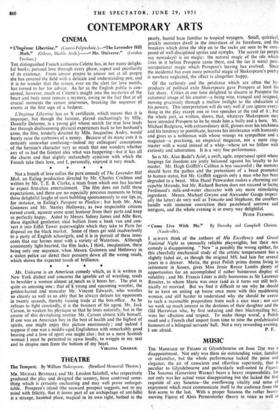MUSIC
THE MARRIAGE OF FIGARO at Glyndebourne on June 21st was 3 disappointment. Not only was there no outstanding voice, familiar or unfamiliar, but the whole performance lacked the poise and elegance, the air of conscious and effortless superiority, that is peculiar to Glyndebourne and particularly well-suited to Figaro. The Susanna (Genevieve Warner) bears a heavy responsibility, for not only was her actual voice disappointing but she lacked the first requisite of any Susanna—the overflowing vitality and sense of enjoyment which must communicate itself to the audience from the first-scene to the last. With a proper Susanna the.rather heavy- moving Figaro of Alois Pernerstorfer (heavy in voice as well as
physical gesture and movement) might well have passed muster, for he used his voice well and was a scrupulous if uninspiring actor. Dorothy MacNeil's Cherubino matched the Susanna of her com- patriot. Can it be that stage personality and infectious vitality, such marked characteristics of the singers and actors in American musicals," disappear among more " serious" artists and that in the higher reaches of the profession American singers, overawed by European models, are apt to lose their native qualities without acquiring the parallel European, characteristics ?
The Almavivas for once had the better of their servants vocally, and Lisa della Casa's Countess was the finest performance of the evening. She was a dignified, not wholly sympathetic figure, less emotional than Mozart makes her and more correct. (It was difficult to believe in her plotting with her servants against her husband.) She sang with a fine feeling for line and phrase, and the voice itself, though not of breath-taking beauty, is pure and firm throughout the whole register. Alfred Poell's Count matched her well. He seemed out of place flirting with Susanna, and in his element dis- missing the congratulatory delegation of peasants—a hard man, one would say, without many amiable foibles and not at all likely to admit in public to visiting Barbarina's bedroom. His singing, too, had authority and an austere .dignity, though he gave the impression of being impatient and a spectator rather than actor in the intrigues of the story.
Murray Dickie's Don Basilio, which he has developed at Covent Garden, passed on this occasion from legitimate affectation to an exaggeration which was not always far from parody. Janet Howe's Marcellina suffered from the same failing, and Owen Brannigan threw away Bartolo's,aria in Act I. April Cantelo was a charming Barbarina.
The Royal Philharmonic Orchestra under Fritz Busch, perhaps aware of the lack of sparkle on the stage, played with considerable fire and vigour. By doing so they overwhelmed the smaller voices on several occasions, and the balance in the ensembles was not always good. Glyndebourne has set its own standards, and now, when fewer people can afford to spend £5 on going to any opera, however magnificently performed, that standard must be if anything improved, at any rate maintained. First nights are notoriously bad occasions on which to make a final judgement, and the performance of Figaro may well have improved already. But the material gave no promise of being good enough to ensure the maintenance of the



































 Previous page
Previous page